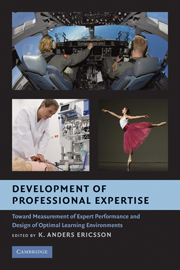 Development of Professional Expertise
Development of Professional Expertise Book contents
- Frontmatter
- Contents
- List of Figures
- List of Tables
- List of Contributors
- 1 The Measurement and Development of Professional Performance: An Introduction to the Topic and a Background to the Design and Origin of This Book
- SECTION 1 CHALLENGES IN PAST AND CONTEMPORARY EFFORTS TO MEASURE AND TRAIN THE OBJECTIVE PERFORMANCE OF PROFESSIONALS
- 2 The 20th-Century Revolution in Military Training
- 3 Developing Professional Expertise with a Cognitive Apprenticeship Model: Examples from Avionics and Medicine
- 4 Leadership Development and Assessment: Examples from Avionics and Medicine
- 5 Revolutions, Leaders, and Diagnosticians: Reflections on the Themes in Chapters 2–4
- SECTION 2 PAST AND CONTEMPORARY EFFORTS TO DESIGN INSTRUCTION, TRAIN, AND MAINTAIN PROFESSIONAL PERFORMANCE
- SECTION 3 THE ASSESSMENT AND TRAINING OF SKILLED AND EXPERT PERFORMERS IN THE MILITARY
- SECTION 4 THE DEVELOPMENT OF EXPERTISE AND EXPERT PERFORMANCE
- Name Index
- Subject Index
- References
5 - Revolutions, Leaders, and Diagnosticians: Reflections on the Themes in Chapters 2–4
Published online by Cambridge University Press: 04 August 2010
- Frontmatter
- Contents
- List of Figures
- List of Tables
- List of Contributors
- 1 The Measurement and Development of Professional Performance: An Introduction to the Topic and a Background to the Design and Origin of This Book
- SECTION 1 CHALLENGES IN PAST AND CONTEMPORARY EFFORTS TO MEASURE AND TRAIN THE OBJECTIVE PERFORMANCE OF PROFESSIONALS
- 2 The 20th-Century Revolution in Military Training
- 3 Developing Professional Expertise with a Cognitive Apprenticeship Model: Examples from Avionics and Medicine
- 4 Leadership Development and Assessment: Examples from Avionics and Medicine
- 5 Revolutions, Leaders, and Diagnosticians: Reflections on the Themes in Chapters 2–4
- SECTION 2 PAST AND CONTEMPORARY EFFORTS TO DESIGN INSTRUCTION, TRAIN, AND MAINTAIN PROFESSIONAL PERFORMANCE
- SECTION 3 THE ASSESSMENT AND TRAINING OF SKILLED AND EXPERT PERFORMERS IN THE MILITARY
- SECTION 4 THE DEVELOPMENT OF EXPERTISE AND EXPERT PERFORMANCE
- Name Index
- Subject Index
- References
Summary
My task is to comment on three papers delivered to a conference on the development of expertise, and included herein. One, by Ralph Chatham, outlines changes in U.S. military training in the late 20th century (Chapter 2). I will also make brief mention of a second paper by Chatham (Chapter 10) in this book), which deals with computer-based training systems. Susan Lajoie (Chapter 3) describes Sherlock, an intelligent tutoring system developed for the U.S. Air Force in the 1980s, and then remarks on some medical intelligent tutoring systems that are now under development, which she regards as follow-ons from the Sherlock project. The third paper, by Michael Mumford and colleagues (Friedrich, Caughron, & Antes), presented as Chapter 4 in this book, reviews and analyzes leadership training. While these papers do not have a common theme, they are somewhat complementary. Chatham lays out a comprehensive set of issues and examples related to learning, training, and retention of skills in the armed services. Are these the right issues? Can psychology help? To what extent do Lajoie and Mumford address the issues Chatham raises? I will try to organize my review around these three questions. In the process I will make some comments that I hope will be useful in thinking about how expertise may be acquired and used, both in the armed services and elsewhere.
At the outset, though, I should say that it may be hard to find a common theme in my own critiques.
- Type
- Chapter
- Information
- Development of Professional ExpertiseToward Measurement of Expert Performance and Design of Optimal Learning Environments, pp. 108 - 128Publisher: Cambridge University PressPrint publication year: 2009
References
- 1
- Cited by
